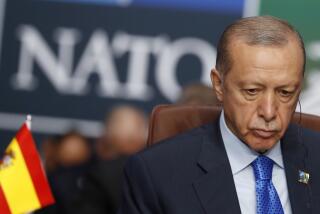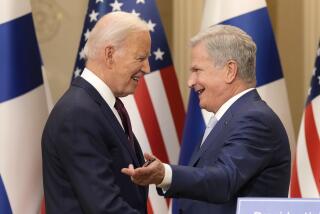Bush Surprised at Soviets’ OK of German Unity Talks
- Share via
WASHINGTON — President Bush expressed surprise Wednesday that the Soviet Union had withdrawn its strong opposition to the U.S.-backed reunification talks of the two German states and permitted “a major breakthrough” in the process.
“This surprised me that they (the Soviets) were willing to make an agreement on that,” Bush said.
“I mean to be very elated about . . . the fact that the Secretary (of State James A. Baker III) was able to close this deal in such a short period of time,” he said in brief remarks to reporters at the White House.
Under the agreement between the East and West German states and the Big Four World War II Allies, Germany has moved onto a fast track to unification on terms the United States could only imagine a year ago.
Senior State Department officials, trying hard not to gloat, said Soviet President Mikhail S. Gorbachev and Foreign Minister Eduard A. Shevardnadze, unlike earlier generations of Soviet leaders, can be persuaded by logic and argument.
But there is little question that Moscow capitulated to Washington both on German reunification and on the closely related issue of troop ceilings in Europe, they said.
The senior officials say Gorbachev’s internal political position appears to have been enhanced by the Communist Party Central Committee meeting last week, possibly making him strong enough to make concessions to the United States without having to worry about second-guessing from Kremlin hard-liners.
But, whatever the reason, the Soviet leadership seems to be either unable or unwilling to resist a U.S. plan for making a united Germany a part of the West, and probably a full member of the North Atlantic Treaty Organization.
Under the procedure approved Tuesday in Ottawa, the West German and East German governments will hold unity talks shortly after East German elections next month. The elections are expected to end 45 years of Communist domination in East Berlin.
Once the German states agree on a unity plan, the foreign ministers of the four major wartime allies--the United States, the Soviet Union, Britain and France--would meet to bless the union. U.S. officials say this plan is designed to give the Soviet Union a role in the process without giving it a veto.
One official said the United States hopes the Big Four will unanimously approve anything agreed to by the Germans. But if the Soviets hold out, “history won’t stop.”
“The trend is in the direction of our overall interests. . . ,” the official said. “My belief is you’re going to see a unification process proceed; you’re going to see a single German state, and that single German state is going to start to make decisions. I am quite confident that those decisions will (coincide) with things that we consider positive, and so there will be some onus on the Soviet Union to try and cooperate in a reasonable fashion to reach results that serve all of our interests satisfactorily.”
The Soviet Union has not yet lifted its objection to a unified Germany being a member of the North Atlantic Treaty Organization. But U.S. officials expect Moscow to yield on that point eventually.
One official said the U.S. position is “membership, membership, membership. The only qualification I’ll put on that is full membership.” On Friday, while visiting Moscow for arms talks, Baker offered a different version, saying a reunified Germany would be a member of NATO or an “associate member.”
Meanwhile, non-government experts generally agreed that developments are going Washington’s way at the moment, although they were a little less euphoric than Administration officials.
Gregory F. Treverton, a senior fellow for Europe of the Council on Foreign Relations in New York, said the emerging terms for German reunification seem to be those that the United States has been supporting for 40 years, mostly in the face of opposition from Moscow and some Western European capitals.
“There is no doubt that the reunified nation will be a member of the (European Community) and Western oriented,” Treverton said.
He praised the Administration for getting out in front of a process that probably was inevitable in any case.
“It is pretty clear that the Germans will do this anyway,” he said. “The Malta summit was a last ditch effort by Gorbachev to enlist the United States in an anti-unification effort.”
Nevertheless, there may be a cloud on the horizon waiting to envelop the Administration’s silver lining. With the Soviet threat evaporating and the division of Europe apparently coming to a close, the United States may not have much of a long-term role to play on the Continent. That is an outcome the Bush Administration has been working hard to avoid.
From the European standpoint, the main reason for the U.S. presence in Europe was to deter Soviet aggression. Bush insisted that “the (Western) allies want the stability of U.S. forces (in Europe) . . . (and) some of the Eastern Europeans want us there, seeing us not as a threat but as a stabilizing influence.”
The Administration hopes to convert NATO from a military to a political alliance, in part to assure a continued U.S. role in Europe. But if Europe really does become whole and free, it is not clear how much longer the U.S. influence will be necessary or desired.
“The future of Europe is being written in the economic field, and the United States is not a very big player because we have no money and we have no institutional role there,” said Charles William Maynes, editor of Foreign Policy magazine.
“We are not going to be satisfied unless we find some way to remain in Europe, invited and rooted in some kind of institutional foundation,” he said. “We don’t have that if NATO disappears. And preserving NATO will be difficult.”
EAST GERMAN AID--Bonn rejects plea for $9 billion but OKs some help. A13
More to Read
Get the L.A. Times Politics newsletter
Deeply reported insights into legislation, politics and policy from Sacramento, Washington and beyond. In your inbox three times per week.
You may occasionally receive promotional content from the Los Angeles Times.










